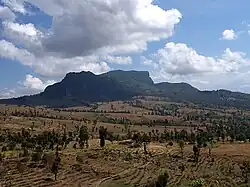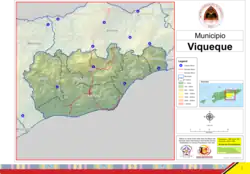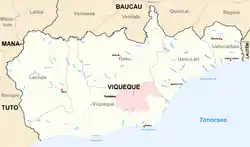Viqueque Municipality
Viqueque (Portuguese: Município Viqueque, Tetum: Munisípiu Vikeke) is the largest of the municipalities (formerly districts) of East Timor. It has a population of 77,402 (Census 2010) and an area of 1,877 km².[2] The capital of the municipality is also named Viqueque.
Viqueque | |
|---|---|
| |
 Rice fields in Viqueque | |
 Seal  Official map | |
 | |
OpenStreetMap | |
| Coordinates: 8°47′S 126°22′E | |
| Country | |
| Capital | Viqueque |
| Administrative posts | |
| Area | |
| • Total | 1,872.7 km2 (723.1 sq mi) |
| • Rank | 1st |
| Population (2015 census) | |
| • Total | 73,033 |
| • Rank | 5th |
| • Density | 39/km2 (100/sq mi) |
| • Rank | 10th |
| Households (2015 census) | |
| • Total | 15,297 |
| • Rank | 5th |
| Time zone | UTC+09:00 (TLT) |
| ISO 3166 code | TL-VI |
| HDI (2017) | 0.602[1] medium · 9th |
| Website | Viqueque Municipality |
Etymology
The word Viqueque is a Portuguese approximation of the local Tetun-Terik word Vikeke (or Wekeke), which has been translated as both 'eroding water'[3] and 'water' (we) 'bracelet' (keke).[4]
The background to the latter translation is that a warrior leader, Luka, is said once to have been on a campaign with his warriors against the Wehali people, who had entered Luka's lands via Suai, Same, and Manatuto. During the campaign, he and the warriors came upon a spring guarded by an old woman. After the woman had given the warriors the water they had asked for, they cut off her arm, on which she had been wearing a bracelet. They then took the arm and bracelet to their king, Nai Lu Leki, who hung the arm in a tree. He also kept the bracelet and declared it sacred, as We Keke.[5]
According to another tradition, a queen of the kingdom of Luka gave a bracelet to Viqueque as an heirloom, and today the municipality is named after it.[6]
Geography
Viqueque is on the south coast of Timor, on the Timor Sea. It borders the municipalities of Baucau to the north, Lautém to the east, and Manatuto to the west. The borders of the then district were the same in colonial times.
On the south coast, the people report both myths and possible occurrences of crocodiles.
 Administrative posts of Viqueque |
 Cities and rivers of Viqueque |
Administrative posts
The municipality's administrative posts (formerly sub-districts) are:[7]
- Lacluta[8]
- Ossu
- Uato-Lari (which was known in Portuguese Timor as Leça, and, in Tetum, is spelled Watulari)
- Uatucarbau (spelled Watucarbau, in Tetum)
- Viqueque
The administrative posts are divided into 35 sucos ("villages") in total.
Demographics
Viqueque is a homeland of the Malayo-Polynesian language Tetum. In East Timor it is co-official with Portuguese. In the east part of the municipality live speakers of the Papuan language Makasae.
References
Notes
- "Sub-national HDI - Area Database - Global Data Lab". hdi.globaldatalab.org. Retrieved 13 September 2018.
- "VIQUEQUE EM NÚMEROS: ESTATÍSTICA MUNICÍPIO DE VIQUEQUE" (PDF). Statistic Timor-Leste. 2014. Retrieved 22 February 2017.
- Hull, Geoffrey (June 2006). "The placenames of East Timor" (PDF). Placenames Australia: Newsletter of the Australian National Placenames Survey: 6–7. Archived (PDF) from the original on 14 February 2017. Retrieved 5 June 2018.
- "The Real Political and Cultural Meaning and Short History of Koba Lima and Suai". Suai Media Space. Retrieved 26 April 2022.
- "Profile: 2. Toponymy". Viqueque Municipality. Retrieved 18 July 2022.
- Barnes, Susana; Hägerdal, Hans; Palmer, Lisa (1 January 2017). "An East Timorese Domain: Luca from Central and Peripheral Perspectives". Bijdragen tot de Taal-, Land- en Volkenkunde. Brill Publishers. 173 (2–3): 325–355. doi:10.1163/22134379-17302020. ISSN 2213-4379. S2CID 164878269.
- Gunn, Geoffrey C (2011). Historical Dictionary of East Timor. Lanham, Maryland: Scarecrow Press. p. 174. ISBN 9780810867543.
- Allison Jess (17 April 2015). "A unique relationship: North East Victoria and East Timor". ABC Goulburn Murray. Retrieved 22 February 2017.
Bibliography
- Munisipio Viqueque: Planu Estartejiku Desenvolvimentu Munisipal [Viqueque Municipality: Municipal Strategic Development Plan] (Report) (in Tetum). Ministry of State Administration (East Timor) / Administration of Viqueque Municipality. 2015. Retrieved 18 July 2022.
- Perfil Distritu Viqueque [Viqueque District Profile] (PDF) (Report) (in Tetum). 2012. Archived (PDF) from the original on 3 March 2014. Retrieved 18 July 2022.
- Viqueque District Development Plan 2002 - 2003 (PDF) (Report). April 2002. Archived from the original (PDF) on 28 March 2009. Retrieved 27 February 2022.
External links
![]() Media related to Viqueque (Municipality) at Wikimedia Commons
Media related to Viqueque (Municipality) at Wikimedia Commons
- Viqueque Municipality – official site (in Tetum with some content in English)
- Viqueque Municipality – information page on Ministry of State Administration site (in Portuguese and Tetum)